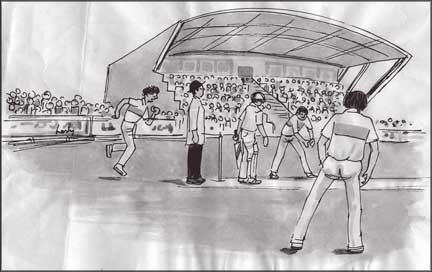There is no 'cricket' in the UNP
 T M Dilshan stepped down from the captaincy of Sri Lanka cricket
citing 'inability to live up to expectations' as the reason. By this act
Dilshan, no doubt, lost the recognition he commanded as the captain of
the national cricket team together with the perks that go with that
title. T M Dilshan stepped down from the captaincy of Sri Lanka cricket
citing 'inability to live up to expectations' as the reason. By this act
Dilshan, no doubt, lost the recognition he commanded as the captain of
the national cricket team together with the perks that go with that
title.
That decision however, in the face of things, is taken in the best
interest of the game of cricket in Sri Lanka; the only game for which
Sri Lanka has reached international recognition. The message simply is,
'Since the performance of the team under my leadership is below par,
here I make way for someone more suitable'. Dilshans may come and
Dilshans may go but the important thing from the national perspective is
that the game of cricket has to go on.

At the press conference held to explain his decision Dilshan was
asked whether there was 'political interference' during his tenure to
which the former captain responded with a wide grin implying 'No'. The
unfortunate thing, however, was none of the journalists present thought
it fit to ask Dilshan whether he has learnt anything from the country's
politicians. Because had Dilshan taken a leaf out of the country's
political leadership (UNP) he could have remained as captain for
sometime citing the 'absence of a suitable person' to take over the
captaincy.
That way he could have survived but at the cost of the game; just as
the present UNP leader is surviving at the cost of the party.
National image
Cricket however is only a game that brings prestige and enhances the
national image whereas politics has everything to do with country's
governance. Thus when the politicians fall below the cricketers in
character and principles such fallouts would naturally get reflected in
the people's forum, giving the UNP only 27 percent of the national vote
in recent polls as against the 48 percent it traditionally enjoyed.
Some lackeys of the present UNP leader however would still try to
justify their support by stating that "Our party has a history of
rebounding from eight seats in 1956 and 17 seats in 1970 and therefore
just keep your fingers crossed and we will be back in business soon".
Such blindly optimistic reasoning ignores the realities of those
political resuscitations in that there were changes of leadership after
those defeats in both those instances. In 1956, the UNP leadership
changed from Sir John Kotelawala to Dudley Senanayake and in 1970 JR
Jayewardene took over the leadership upon Dudley's demise.
Similarly if Dilshan too was blindly optimistic like Ranil, he too
could have just waited for a 'change in luck' without precipitating the
change that was necessary.
Leadership change
The other point to note about the UNP's political sustenance is that
though the party lost badly in 1956 and 1970, its national vote
percentage always hovered around a healthy 48 percent and it was because
of the past the post election system that they could not get the seats
in 1956 and 1970. The situation today however is different and the UNP
is down to 27 percent in its national vote and there are 45 seats in
Parliament purely due to the proportional representation introduced in
1988. Therefore the UNP today is truly in an abyss but yet there is
still no captain like Dilshan in the UNP to usher in the changes.
The government would not be interested in a leadership change in the
UNP because it is common knowledge that the government interest would be
best served by a UNP under Ranil Wickremesinghe. The issue however is
that the government could go in to bouts of complacency with an
Opposition leader like Ranil and that would jeopardize the country's
future as well as the democratic system. It is in that regard that we
would urge the UNP to not abdicate its national role as the alternative
government in waiting, paving the way to a one party state.
Retirement from politics
Joachim Chissano was the President of Mozambique for two terms and
despite his popularity at the end of his second term he announced his
retirement from politics. People of Mozambique were dismayed and at a
press conference one journalist asked President Chissano as to why he
was quitting when the whole country wished him to continue in politics.
President Chissano replied him thus, "Even in a packet of milk there is
a date of expiry. After that it emits a foul smell. I think that this
theory is common to politics as well. Therefore I should bid farewell to
politics before I become stale."
Well, in Mozambique politicians are quitting due to the fear of being
rendered stale but in Sri Lanka the politicians are not quitting even
after they have been proved to be stale. Are we as a nation behind
Mozambique in our politics? |



